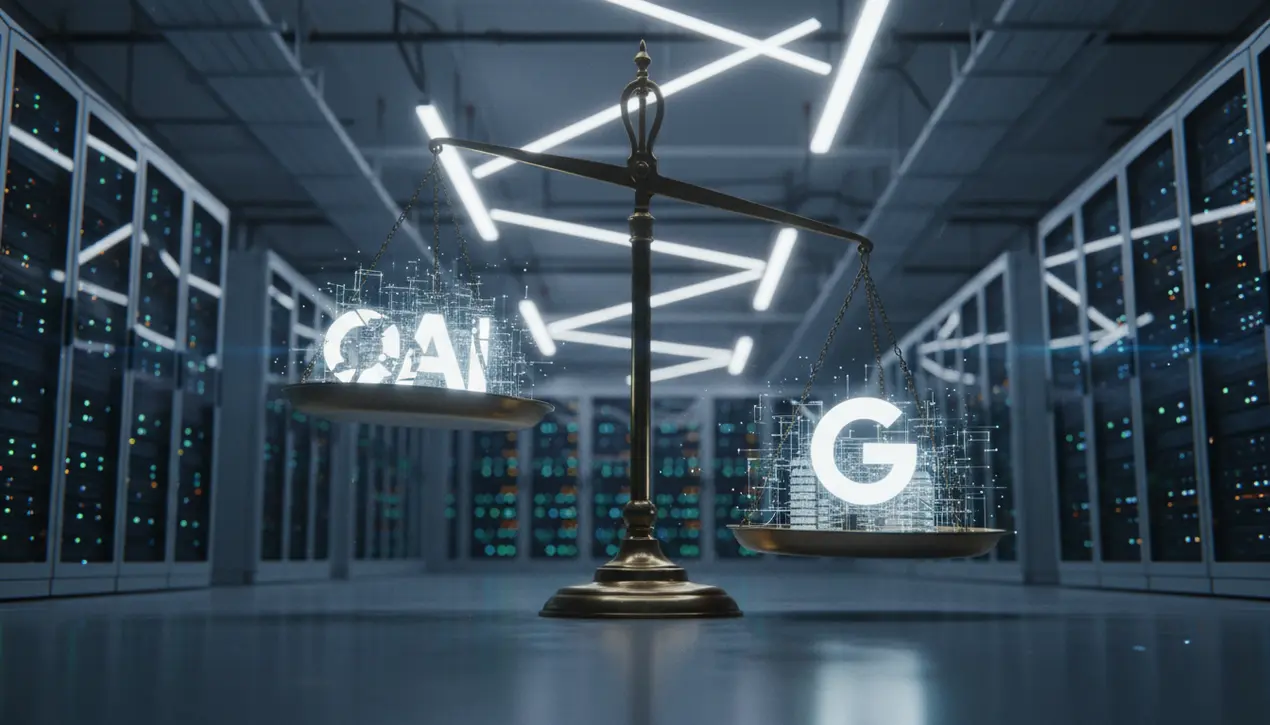
AIlarge language modelsGoogle Gemini
The balance of AI power tilts toward Google
DA
Daniel Reed
7 hours ago7 min read
The world's most popular chatbot, ChatGPT, now faces an existential threat from its primary competitor as Google's Gemini 3 Pro emerges not merely as an alternative but as a potential paradigm shifter in the artificial intelligence landscape. This development marks a dramatic reversal from three years ago when OpenAI's release of ChatGPT caught the search giant flat-footed, forcing a reactive posture.The recent rollout of Gemini 3, however, has fundamentally altered the competitive dynamics, with its superior performance on key benchmarks, seamless integration into Google's vast ecosystem—from Search to the Gemini app—and significant cost efficiencies applying immense pressure on OpenAI. Internally, the situation has prompted OpenAI CEO Sam Altman to prepare his staff for what he termed 'rough vibes' and 'temporary economic headwinds,' a stark admission of the challenge posed by Google's latest model, as reported by The Information.The historical precedent for such rapid shifts in tech dominance is littered with the ghosts of Betamax, AltaVista, and MySpace, but the velocity of the AI race is unprecedented, compressing what used to be years of competitive maneuvering into mere months. Even prior to this release, OpenAI was grappling with declining user engagement, a trend highlighted by Sources.news, partly attributed to content restrictions that, while designed for safety, inadvertently constrained user experience and consumption. The state of play was concretely defined on November 18th with Google's official release of Gemini 3 Pro, an event that has since been met with rave reviews from industry insiders and analysts who point to its technical prowess as a direct counter to the relatively underwhelming launch of GPT-5 in August.A telling endorsement came from Salesforce CEO Marc Benioff, who after a two-hour session with the new model, declared on X, 'I'm not going back. The leap is insane — reasoning, speed, images, video… everything is sharper and faster.It feels like the world just changed, again. ' This sentiment underscores a significant shift in perception, though it is not universally held.Shanea Leven, a former Googler and current CEO of Empromptu. ai, provided a crucial reality check, noting in an email to Axios that while 'Google is unmatched at the data [it] can train on,' granting it unparalleled knowledge across specialized topics, this advantage comes with a caveat.She observed that when Gemini encounters an information gap, it demonstrates a greater propensity to hallucinate—to confidently generate plausible but incorrect information—compared to ChatGPT-5, highlighting a critical trade-off between breadth of knowledge and reliability that remains a central challenge in large language model development. Zooming out, the irony is profound; the generative AI revolution arguably began with Google's own 2017 'Transformer' paper, which laid the foundational architecture that OpenAI, Anthropic, and others have built upon.Many of the leading researchers at these competing firms are, in fact, alumni of Google's AI divisions. The company possesses nearly every structural advantage imaginable: immense revenue streams from its advertising empire, global-scale cloud infrastructure, and the unparalleled distribution network to deploy new AI features to billions of users instantaneously.Furthermore, Google stands as one of the few credible competitors to Nvidia in the critical arena of custom AI chip design with its Tensor Processing Units (TPUs). Given these overwhelming assets, the most surprising aspect of Google's recent surge is not that it happened, but that it took so long to materialize.Nevertheless, OpenAI is not without its defenses. It retains formidable brand loyalty cultivated over years, boasting a massive user base of approximately 800 million weekly active users.It has also been aggressively innovating on the user-experience front, introducing sophisticated memory features that allow ChatGPT to personalize interactions based on a user's history and preferences—a sticky functionality that creates significant switching costs, as it is not a simple process to export and import this historical context into a rival platform like Gemini. Looking ahead, the key metric to watch is whether Gemini 3 can sustain and extend its current lead in benchmark tests, a prospect that seems likely with the impending broad release of its enhanced reasoning mode, Gemini 3 Deep Think. This ongoing battle is less a sprint and more a marathon of continuous innovation, where today's technical lead can be rendered obsolete by tomorrow's architectural breakthrough, ensuring that the balance of power in AI will remain a fluid and fiercely contested domain for the foreseeable future.
#Google Gemini
#OpenAI
#ChatGPT
#AI competition
#featured
#large language models
#AI benchmarks
#enterprise AI
Stay Informed. Act Smarter.
Get weekly highlights, major headlines, and expert insights — then put your knowledge to work in our live prediction markets.
Comments
Loading comments...
© 2025 Outpoll Service LTD. All rights reserved.